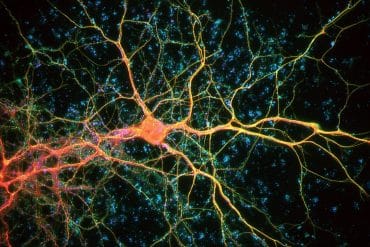Summary: Move over humans, monkeys can think deeply too! A novel study has shown that monkeys are capable of careful decision-making by considering costs, consequences, and constraints. Findings reveal our primate cousins are capable of making optimal choices instead of impulsive decisions.
Source: University of Pittsburgh
A paradigm-shifting study published today in Nature Neuroscience shows that, just like humans, monkeys are capable of complex deliberation and careful decision-making.
The study is first to show that monkeys can think deeply about a problem and consider combinations of factors such as costs, consequences and constraints. In doing so, monkeys can find optimal outcomes rather than impulsively reaching for the first available option.
“Humans are not the only animals capable of slow and thoughtful deliberation,” said senior author William Stauffer, Ph.D., assistant professor of neurobiology at the University of Pittsburgh School of Medicine.
“Our work shows that monkeys have a rich mental state that renders them capable of intelligent thinking. It’s a new paradigm for studying the neurophysiological basis for deliberative thought.”
Consider a fundamental question: how do we, as humans, think about what we want? What happens in our brains when we close our eyes and deliberate over complex questions, such as who to spend time with or what to study at school? And are other animals, including monkeys, capable of the same complexity of thought?
Several decades ago, the Nobel Prize laureate Daniel Kahneman, Ph.D., revolutionized the field of behavioral economics with Prospect Theory. In his book, “Thinking Fast and Slow,” he postulated that humans employ two distinct systems of thinking: one nearly instantaneous that happens automatically, and the other much slower conscious logical reasoning that requires more mental effort.

Kahneman dubbed the first, effortless, type of thinking as ‘fast’ and the second as ‘slow.’ Slow, effortful thinking enables us to write music, develop scientific hypothesis and balance our checkbooks.
As it turns out, humans’ slow thinking is not unique.
By presenting monkeys with combinatorial optimization problems in what Pitt neuroscientists dubbed the ‘knapsack task’ and rewarding the animals based on the value of the submitted solutions, researchers showed that monkeys employed sophisticated mathematical reasoning and used efficient computational algorithms to tackle complex problems.
The scientists discovered that the animals’ performance and speed of deliberation was dependent on the task’s complexity, and that their solutions closely matched those generated by efficient computer algorithms designed specifically to solve the optimization problem.
“Results from this work will contribute neurophysiological evidence to enlighten centuries of discussions about dual process theories of the mind, the structure of thoughts, and the neurobiological basis of intuition and reasoning,” wrote Stauffer in an accompanying research briefing.
Tao Hong of Carnegie Mellon University is the lead author of the paper.
Title and summary constructed with the assistance of ChatGPT AI technology.
About this animal cognition research news
Author: Anastasia Gorelova
Source: University of Pittsburgh
Contact: Anastasia Gorelova – University of Pittsburgh
Image: The image is in the public domain
Original Research: Open access.
“Computational complexity drives sustained deliberation” by Tao Hong et al. Nature Neuroscience
Abstract
Computational complexity drives sustained deliberation
Economic deliberations are slow, effortful and intentional searches for solutions to difficult economic problems. Although such deliberations are critical for making sound decisions, the underlying reasoning strategies and neurobiological substrates remain poorly understood.
Here two nonhuman primates performed a combinatorial optimization task to identify valuable subsets and satisfy predefined constraints.
Their behavior revealed evidence of combinatorial reasoning—when low-complexity algorithms that consider items one at a time provided optimal solutions, the animals adopted low-complexity reasoning strategies. When greater computational resources were required, the animals approximated high-complexity algorithms that search for optimal combinations.
The deliberation times reflected the demands created by computational complexity—high-complexity algorithms require more operations and, concomitantly, the animals deliberated for longer durations.
Recurrent neural networks that mimicked low- and high-complexity algorithms also reflected the behavioral deliberation times and were used to reveal algorithm-specific computations that support economic deliberation.
These findings reveal evidence for algorithm-based reasoning and establish a paradigm for studying the neurophysiological basis for sustained deliberation.







